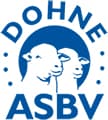Father passes his passion for stud sheep down to his 14-year-old son
Article courtesy of ACM (Philippe Perez) Stock & Land

Harrison and Darren Gurnett, Gunyado Dohne stud, Kerang East. Picture by Philippe Perez
Gunyado Dohne stud co-principal Darren Gurnett, Kerang East, has spent the last year travelling to sheep shows to discuss genetics within the breed, but he has been looking forward to the Australian Sheep & Wool Show in particular.
Mr Gurnett said Dohnes being the feature breed at this year’s ASWS was a “significant step forward” for the breed.
He said Dohnes once had a reputation for not producing high-quality wool, but he believed that reputation was starting to turn around.
“The wool on a Dohne now is as good or better than a lot of Merinos… and studs have put years of breeding work in to get that balance of a good meat sheep that also has good wool,” he said.
“The Dohne is one of the few breeds where we do all measurements from conception right through, from when the lamb is born, through to a 100-day weight of full data with wool weights, fibre diameters to yield.
“Every time the ewes come through at joining, we weigh them too so people can see what the sheep are doing.”
He said Dohnes tended to keep their body weight when it was dry, and this worked well for farmers explicitly looking for dual-purpose sheep.
He said the response to their marquee at last year’s ASWS showed encouraging signs for the breed.
“The Australian Dohne Breeders Association committee worked really hard to get to this point… with last year being a good prequel to this year,” he said.
“The association is a great board and is full of people that put a lot of time with out being paid to do it.”
Part of that hard work is also educating students at ASWS this year.
“On the Friday of the show, there’s two schools attending and we’ll run a program with the wool and then another session talking about the understanding of the sheep, what you look for and things like that,” he said.
Mr Gurnett started breeding Dohnes commercially while running his Bazadais and Brahman cattle stud.
“I just wanted to take things for the Dohnes to the next level to produce a top-quality article, which will always be worth more than a bad article,” he said.
“I have also bred poultry since I was a kid and love the breeding side of things and looking at genetics.”
Last year, Dohne producers from South America also visited the ASWS to learn what Australian farmers were doing to improve genetics.
“After the Bendigo show last year, the group toured South Australia and NSW, and since then there have been orders for semen from that trip too,” he said.
“We think many breeders of Dohnes are setting a benchmark worldwide.”
He said Dohne breeders were based across the country, from the Western Australian Wheatbelt to the Queensland outback town of Longreach.
He said the ability to adapt to those variable climates and focus on working with non-mulesed sheep were “key values” among many breeders.
“We featured new classes at Bendigo last year for a champion bare-breeched ram won by John Nadin from Macquarie Dohnes and a champion bare-breeched ewe, which our stud won,” he said.
The Gurnett family’s knack for growing genetics has passed down to Darren’s son Harrison, 14, who began his first sheep stud five years ago.
He got off to a cracking start with a champion Shropshire ram victory at last year’s ASWS but also began his own journey into Dohnes last year.
“I bought a really-good, reliable ram from John Nadin at Macquarie and 70 or so ewes and picked out 30 of that lot, so we’ll see what lambs we’ll be getting from them,” Harrison said.
“So far with my stud and working with Dad, I’ve just found Dohnes are a good dual-purpose sheep moreso than other dual-purpose sheep, so that’s been working well.”
Mr Gurnett said other significant steps for the breed included the establishment of an innovative sire evaluation trial using Dohne commercial ewes at Coonong Station, Urana, NSW, and data tracking of wether lambs processed at Gundagai Meat Processors.
“The things we are doing outside the competition, like the parade and marquee, will hopefully show people that Dohnes are bringing a lot to the table,” he said.










 Facebook
Facebook YouTube
YouTube Instagram
Instagram